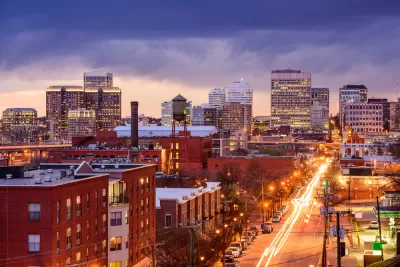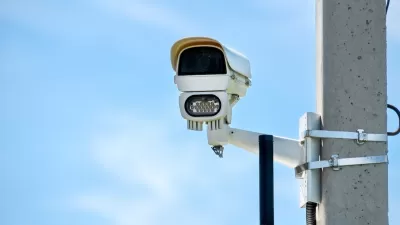After voting to lower speed limits citywide, Richmond found itself with a $5.2 million bill for new signage, prompting the city council to pull the ordinance.

When the Richmond, Virginia city council voted to lower its default speed limit to 20 miles per hour in an effort to reduce the risk of death or severe injury in crashes involving pedestrians, they were told that the change would cost $5.2 million.
As Wyatt Gordon explains in Greater Greater Washington, lowering speed limits is shown to vastly improve the chances of survival during a crash. “A person hit by a car traveling 30 mph is 70% more likely to be killed than if struck by a driver going 25 mph, for example. Assuming Richmonders one day follow a citywide 20 mph default speed limit, pedestrians would face a 93% chance of surviving any given crash in the River City.”
But Richmond city officials are interpreting the change to mean a new speed limit sign on every block, which drives up the cost of the project. As Amy Robins, council liaison for the 5th district, explained, “Our office couldn’t justify that amount spent on signs versus narrowing roads and adding bike lanes and raised crosswalks, so we pulled the ordinance.” The ordinance also would not have applied to state-owned streets that pass through Richmond.
“For now, Richmond residents can submit a request for a new speed limit sign on their streets as low as 15 mph via the RVA 311 app.” Out of 15 civic associations in the 5th District, 14 have already applied for lower speed limits, signaling a strong demand for safer streets. According to Gordon, “Del. Carr plans to introduce a bill to the General Assembly this month that would remove the need for costly individual block signage and traffic studies, and allow any Virginia locality to instead post default speed limit signs at its borders to notify drivers of the lower limit.”
FULL STORY: Why should it cost $5.2 million to lower the speed limit 5 mph in Richmond?

Alabama: Trump Terminates Settlements for Black Communities Harmed By Raw Sewage
Trump deemed the landmark civil rights agreement “illegal DEI and environmental justice policy.”

Planetizen Federal Action Tracker
A weekly monitor of how Trump’s orders and actions are impacting planners and planning in America.

The 120 Year Old Tiny Home Villages That Sheltered San Francisco’s Earthquake Refugees
More than a century ago, San Francisco mobilized to house thousands of residents displaced by the 1906 earthquake. Could their strategy offer a model for the present?

Ken Jennings Launches Transit Web Series
The Jeopardy champ wants you to ride public transit.

BLM To Rescind Public Lands Rule
The change will downgrade conservation, once again putting federal land at risk for mining and other extractive uses.

Indy Neighborhood Group Builds Temporary Multi-Use Path
Community members, aided in part by funding from the city, repurposed a vehicle lane to create a protected bike and pedestrian path for the summer season.
Urban Design for Planners 1: Software Tools
This six-course series explores essential urban design concepts using open source software and equips planners with the tools they need to participate fully in the urban design process.
Planning for Universal Design
Learn the tools for implementing Universal Design in planning regulations.
Clanton & Associates, Inc.
Jessamine County Fiscal Court
Institute for Housing and Urban Development Studies (IHS)
City of Grandview
Harvard GSD Executive Education
Toledo-Lucas County Plan Commissions
Salt Lake City
NYU Wagner Graduate School of Public Service





























